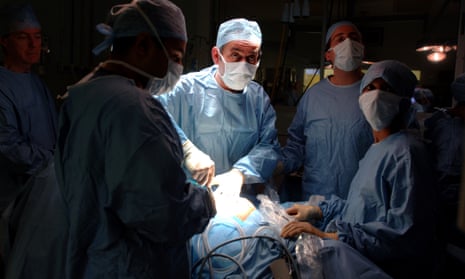Google DeepMind, the tech giant’s London-based company most famous for its groundbreaking use of artificial intelligence, is developing a software in partnership with NHS hospitals to alert staff to patients at risk of deterioration and death through kidney failure.
The technology, which is run through a smartphone app, has the support of Lord Darzi, the surgeon and former health minister in the Blair government who is director of the Institute of Global Health Innovation at Imperial College London.
“Innovation is the only solution we have for a sustainable NHS, both economically and in meeting the challenges and demands upon it,” Darzi told the Guardian in a preview of the technology.
Darzi has led a team working on a smartphone app called Hark for the last five years, which DeepMind has now acquired and will develop. Hark identifies the tasks that need to be performed to prevent a patient who has been admitted to hospital deteriorating, allocates them to the right staff, and tracks what has been done – or not done.
Their research, published in the journal Surgery, showed that half of hospital patients do not get the care they need fast enough, usually because of poor communication, particularly when one team of doctors or nurses hands over to another. In early pilots at St Mary’s Hospital, part of Imperial College Healthcare NHS Trust, where Darzi is a consultant surgeon, they found medical staff responded 37% faster when alerted by the Hark app than when they used pagers.
The app will pick up relevant information from the electronic patient record, so that medical staff have a complete picture of the patient’s condition and medical history. It will also provide a record of what actions are taken by nurses and doctors. Often they have to ask the patient whether they have had a blood test or been given their medication.
Despite DeepMind’s expertise in artificial intelligence (AI) and machine learning, the smartphone app being piloted does not use either technology. Mustafa Suleyman, co-founder and head of applied artificial intelligence at DeepMind, said “that may change in the future”.
“For the moment these are just early pilots,” he said. “For the moment there’s no AI or machine learning.”
Even without an AI application, the involvement in NHS patient data of a tech giant that routinely gathers, and profits from, data from users’ emails, internet searches and map locations could raise ethical questions.
Suleyman, however, said they were taking extensive precautions to protect patient data and had asked prominent medical and technology leaders to act as unpaid independent reviewers of the division of DeepMind overseeing the project.
“They’ll be able to scrutinise our work and publish reports as they see fit,” Suleyman said.
“The hospital will always own and control that data. We have a processing agreement that allows us to securely stream the information straight to a clinician’s mobile phone. The data will never leave the UK and it will never be linked or associated with Google accounts, products or services.”
At the Royal Free, consultant nephrologist Chris Laing, both a kidney expert and associate medical director for patient safety, said he brought in DeepMind because of his concern over acute kidney failure in patients admitted to hospital, which can cause rapid deterioration and death. He and his colleagues helped DeepMind develop and trial an app called Streams, which alerts medical staff almost instantly to the results from routine blood tests showing up dangerous levels of creatinine, indicating the kidneys are not working well.
Laing said thousands of blood tests are carried out every day on patients in the Royal Free NHS Foundation Trust hospitals, which include Barnet and Chase Farm. He can review the results and focus on those the app tell him are of concern from his phone at any time. “I’m on the move. A lot of our clinicians are on the move. It is very time consuming to log into [static] computer systems. Wherever I am, over three hospital sites or 20 community sites, I can access this information,” he said.
Suleyman said the company hoped to work on alerts for other life-threatening conditions too, such as sepsis – or blood poisoning. “Everybody has a smartphone and we all use apps all the time,” he said. “But the people doing incredible work saving lives every day are hampered by using desktop computers and software designed a long time ago.”
The apps his team are designing are not a one-off commodity, he said, but will change as the need and the information changes. “The software we are building today will look completely different in a few years’ time,” he said. Suleyman said there were no immediate plans for this to be a commercial operation, though that could change in the future.
Darzi believes the apps will prove very popular with NHS staff. “I have no doubt it will take off throughout the NHS,” he said. “It will get stronger and better and more intuitive. It will be a pull, not a push technology. If you find a way of making doctors’ lives easier they will pull the thing as quickly as they can.”

Comments (…)
Sign in or create your Guardian account to join the discussion